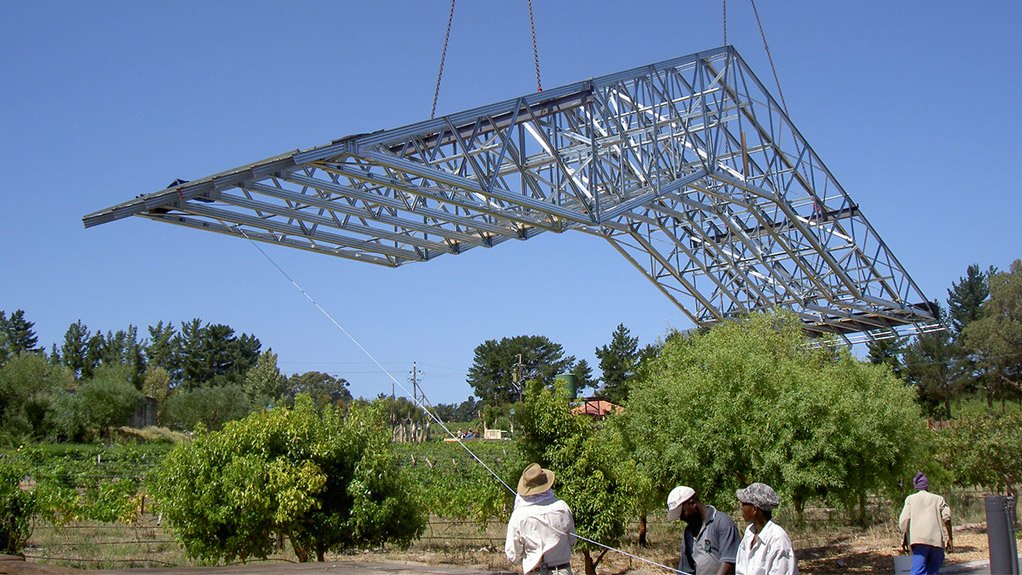Steel industry faces toughest year


SURVIVAL The Southern African Institute of Steel Construction says the local steel construction industry will survive the current challenging environment owing to years of resilience
As local steel demand stagnates and exports decrease, various steel industry role-players and industry analysts have predicted this year will be the toughest one for local steel manufacturers, as companies have been forced to mothball or sell plants, cut jobs and even close operations.
Engineering News reported earlier this month that steel manufacturer Evraz Highveld Steel & Vanadium business rescue practitioners are seeking to sell individual components of the enterprise as going concerns, after failure to secure the sale of the business to International Resources Limited, of China. The transaction collapsed after the conditions precedent were either not fulfilled or waived by the January 31 deadline.
However, steel construction industry representative organisation the Southern African Institute of Steel Construction (Saisc) CEO Paolo Trinchero predicts the steel construction industry will survive 2016, owing to several years of resilience and persistence by local steel fabrication companies through challenging times.
He says the South African steel industry has been affected by political uncertainty during 1994 and economic depression in 2008 – which it survived, subsequently finding ways of adapting to economic and political pressures.
Trinchero’s sentiment is that 2016 cannot be much worse than 2015 was for the steel industry.
“The challenges faced by the steel industry this year are the culmination of business politics in South Africa and overseas steel strategies being affected on the South African market,” he points out.
An example of this practice is evident with large steel-producing nations of the Brics (Brazil, Russia, India, China and South Africa) bloc preying on South Africa by selling large volumes of often low-grade steel to South Africa, mostly through subsidised prices, says steel manufacturers association the International Steel Fabricators of South Africa (ISF) CEO Neels van Niekerk.
This leads to dumping low-grade steel on the South African market, thereby lowering the local value of steel, owing to an oversupply, and endangering local manufacturers and suppliers of steel products because they are not domestically competitive.
Van Niekerk therefore advocates amendments to South Africa’s import policy in this regard.
“The Chinese steel industry never imports steel products – although it may import raw materials. Even when Chinese companies and consortiums operate in other countries (on large infrastructure projects) they do not purchase steel from those respective countries, but import Chinese-made steel to maximise their steel exports,” he explains.
Market Stimulation
Trinchero says large-scale stimulation is needed to grow the South African steel industry and market, as the industry has recently been fulfilling only small orders for various projects as a means of simply obtaining work and surviving.
“The easiest and fastest way to stimulate the steel market in South Africa is to initiate projects of the National Development Plan, as the steel industry currently has a lot of idle manufacturing capacity, which results in large-scale losses in productivity and unnecessary ageing of equipment,” he notes.
Another step to catalyse growth is to enhance South Africa’s export of steel products.
“There exists large potential to manufacture locally for foreign markets, as local industry can produce at good quality and high volumes. In many instances, it has become the norm for South Africa to be easily bargained down on price for international orders.”
Van Niekerk refers to China, which often bids with significantly low steel prices for South African projects using a $/t value of steel. However, most of Chinese exported (especially to Africa) steel is low grade and, therefore, heavier than the better-quality steel produced in South Africa.
Therefore, steel used on the same project will require larger volumes from Chinese producers than from South African producers because local steel producers are skilled in producing light steel suitable for heavy-duty tasks, he explains.
He implies that taking these weight and load-bearing properties into account translates into South African-produced steel becoming increasingly competitive in terms of its $/t value, as less is required for the same project.
This competitive possibility can be realised only if local steel gains confidence in its pro- ducts and markets them appropriately according to the quality standards they are able to achieve, he concludes.
Article Enquiry
Email Article
Save Article
Feedback
To advertise email advertising@creamermedia.co.za or click here
Announcements
What's On
Subscribe to improve your user experience...
Option 1 (equivalent of R125 a month):
Receive a weekly copy of Creamer Media's Engineering News & Mining Weekly magazine
(print copy for those in South Africa and e-magazine for those outside of South Africa)
Receive daily email newsletters
Access to full search results
Access archive of magazine back copies
Access to Projects in Progress
Access to ONE Research Report of your choice in PDF format
Option 2 (equivalent of R375 a month):
All benefits from Option 1
PLUS
Access to Creamer Media's Research Channel Africa for ALL Research Reports, in PDF format, on various industrial and mining sectors
including Electricity; Water; Energy Transition; Hydrogen; Roads, Rail and Ports; Coal; Gold; Platinum; Battery Metals; etc.
Already a subscriber?
Forgotten your password?
Receive weekly copy of Creamer Media's Engineering News & Mining Weekly magazine (print copy for those in South Africa and e-magazine for those outside of South Africa)
➕
Recieve daily email newsletters
➕
Access to full search results
➕
Access archive of magazine back copies
➕
Access to Projects in Progress
➕
Access to ONE Research Report of your choice in PDF format
RESEARCH CHANNEL AFRICA
R4500 (equivalent of R375 a month)
SUBSCRIBEAll benefits from Option 1
➕
Access to Creamer Media's Research Channel Africa for ALL Research Reports on various industrial and mining sectors, in PDF format, including on:
Electricity
➕
Water
➕
Energy Transition
➕
Hydrogen
➕
Roads, Rail and Ports
➕
Coal
➕
Gold
➕
Platinum
➕
Battery Metals
➕
etc.
Receive all benefits from Option 1 or Option 2 delivered to numerous people at your company
➕
Multiple User names and Passwords for simultaneous log-ins
➕
Intranet integration access to all in your organisation


















